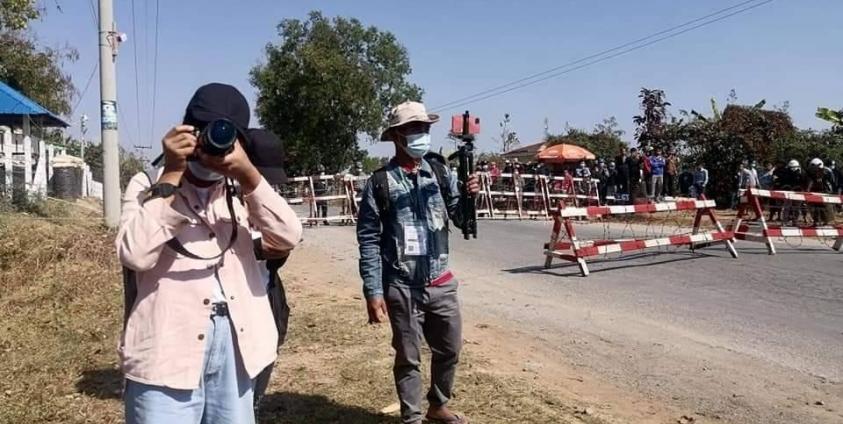On April 16, the Karenni State Interim Executive Council (IEC) issued a 'Directive on “ Media Code of Conduct’, comprising eight guidelines obligatory for all local and foreign media personnel including freelancers, reporting in Karenni State.
One of these guidelines prohibits actions that could disrupt the operational and administrative workings of Karenni State or endorse the Junta during the ongoing revolution, despite the inherent right of all media outlets to report in the region.
IEC Secretary No. 2 U Banyar informed Kantarawaddy Times that these guidelines are considered essential for security in active conflict zones of Karenni State.
"Access to information is undoubtedly crucial. However even in other war-zones around the world, roaming freely to gather news is generally not permitted. It is also general rule that journalist must first obtain a visa, stating whether it is press visa or a visiting visa.
“Consequently, we have mandated that individuals entering conflict zones for news coverage must liaise with relevant authorities and confine themselves to authorized areas.”, he said.
U Banyar reiterated the necessity, of authorization by either IEC or relevant armed organizations in Karenn State. ”One huge problem is that certain journalists on the frontlines tend to operate in a disorderly manner. This puts the relevant officials in difficult positions. It is an issue we encounter ”, frequently he explained.
Nan Paw Gay, chairperson of The Independent Press Council Myanmar (IPCM), remarked that the 'Directive on the Media Code of Conduct' issued by the IEC impacts journalists' could pose a threat to press freedom..
"This situation has presented some challenges to freedom of access to information Failure to abide by professional and ethical standards by certain media, could have a damaging effect on news media outlets already established in Karenni State, as well as on journalists adhering to ethical standards”, she said.
However Nan Paw Gay also emphasized that only the independent media council should be empowered to issue a media code of conduct. She raised concerns that journalists wearing uniforms and carrying employee identification cards as instructed by IEC, may pose security risks amid the current political and military circumstances.
"In the current circumstances, security is our top priority in media work. I always reach out to the relevant authorities before gathering information, aware of the possible consequences of our reporting. However, I believe IEC's actions are aimed at limiting
media freedom through exercise of authority”, a journalist conducting field reporting in Karenni State she noted.
U Banyar said that guideline number 5, which prohibits actions that could disrupt the operational and administrative workings of Karenni State or endorse the Junta during the ongoing revolution, despite the inherent right of all media outlets to report in the region, is not a restriction on press freedom.
"We support Freedom of Expression, but we also recognize that it should be limited if it harms religious, ethnic, or local communities. Our intention is not to restrict Freedom of Expression, but without careful and effective coordination, media operations during the revolution could encounter more difficulties”, U Banyar pointed out.
Nan Paw Gay emphasized that prioritizing security in conflict areas is crucial for every journalist, and given the present situation, it is generally acceptable for journalists to coordinate with relevant organizations before conducting media work. However mandating journalists to wear uniforms and carry identification cards poses security risks and represents an arbitrary restriction on press freedom.
There are also suggestions for journalists intending to report from conflict zones to reach out to relevant local organizations beforehand to familiarize themselves with the area's conditions and information access protocols.
"If you are a freelance journalist, it is essential to first contact the information officers of the relevant revolutionary areas, with the backing of your affiliated media outlet, or if you are a freelance reporter associated with IPCM, it is also necessary to follow the same method with the support of the Media Council as well. This allows us to negotiate and find solutions when problems arise and fosters a long-term relationship between the media and resistance organizations”, Nan Paw Gay said.
The guidelines outlined in the 'Directive on the Media Code of Conduct' issued by the IEC are as follows.
1) Any news media agency that travels to Karenni State to cover news must notify the Karenni State Interim Executive Council, along with a recommendation letter from the appropriate news agency.
2) If permission is granted to stay, they must notify the relevant village/ward, village tract, and township administrations.
3) To ensure the safety of media personnel, they shall travel to the location where they intend to cover the news with the approval of the necessary commanders and commanding forces.
4) When they go in the field to gather Information and cover news, they will wear the uniform of the appropriate news media organization and present their journalist ID to request access to news or information.
5) Karenni State's Interim Executive Council will not control the media; any media outlet will have unrestricted access to Information. However, it Interdicts acts that impair the Karenni State's military operations and governance and actions that support an Illegitimate military junta during the revolution.
6) Because this is a revolution-affected territory, if any activities violate the media code of conduct, the Interim Executive Council or Karenni State will assemble the appropriate news media agencies and conduct a mediation/negotiation process.
7) The media must respect the culture, traditions, and customs of the ethnic groups and ethnicities in Karenni State.
8) Freelance journalists, both domestic and foreign, who arrive in Karenni State will be allowed to cover news if they follow the media code of conduct.







